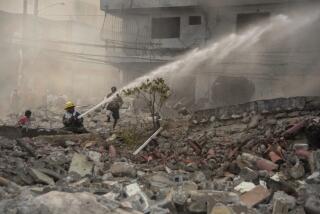Madrid Blast Blamed on Separatists Injures 43
- Share via
MADRID — A car bomb injured at least 43 people near a convention center in the Spanish capital Wednesday as police rushed to evacuate the area after a telephone warning from ETA, the violent Basque separatist group.
The bomb, estimated to contain more than 60 pounds of explosives, went off hours before King Juan Carlos I and Mexican President Vicente Fox were to visit an art fair at the center. Authorities said there was no threat to the leaders and that none of the injuries were serious. Nonetheless, it was the biggest attack blamed on ETA in nearly three years and, analysts said, seemed intended to show that the group remained a threat.
The attack came amid escalating political tension over a gathering campaign for Basque independence. Paradoxically, ETA finds itself weakened on two fronts.
Police in Spain and neighboring France have hammered at the group’s leadership, finances and support structure, most recently with a sweep that rounded up 14 people across Spain on Tuesday. Meanwhile, ETA’s political wing cannot participate in upcoming Basque regional elections because it has been outlawed.
“Clearly, ETA is at its weakest moment in 25 years,” said Juan Aviles, director of the University Institute for Research on Interior Security in Madrid. “It’s down to the remnants. But the end of terrorist groups can be bloody. And the situation in the Basque Country is more complicated than ever; anything could happen.”
Like three other car bombings attributed to ETA in the last two months, the attack appeared designed to spread fear without killing anyone, Aviles said. At 8:55 a.m., a caller to a Basque newspaper warned that a bomb would go off in half an hour outside the Palacio de Congresos, Madrid’s main convention center. Such warnings before bombings are an ETA trademark.
Police rushed to cordon off the area. The explosion about 9:35 made a thunderous noise, sent up a plume of white smoke and shattered windows in office buildings. Flying glass caused most of the injuries.
Six policemen were among the injured, and 24 people were briefly hospitalized, authorities said.
Nonetheless, the king and the Mexican president attended the inauguration of the art fair as scheduled at 7 p.m. Fox may have been a symbolic target because of Mexico’s crackdown on fugitive ETA suspects. A Mexican judge approved the extradition of six accused Basque terrorists last week.
The bombers apparently chose the time and place because of the leaders’ impending visit, but it was unlikely that a blast later in the day would have endangered Fox and Juan Carlos because intense security measures were planned ahead of their visit, Interior Ministry officials said.
Police had been on alert for an ETA strike since the Spanish parliament recently rejected as illegal a referendum on Basque independence proposed by the region’s leader. In response, the nationalists who run the Basque autonomous government intend to push ahead with regional elections this spring to demonstrate public support for their cause. And ETA, analysts say, wants to influence that tense political process.
Analysts see the bombing as part of a complex battle of nerves that includes speculation that the Socialist-led government of Prime Minister Jose Luis Rodriguez Zapatero has begun secret negotiations with ETA. Many Spaniards reject the idea of negotiating with ETA and think the group is on the verge of extinction.
On Wednesday, Interior Minister Jose Antonio Alonso denied that talks were underway with ETA, which is classified as a terrorist group by the European Union and the United States.
“There is no negotiation between the government and the ETA terrorist organization,” Alonso told journalists. “And here I would implore that we stop speculating and focus on the rigor and reason of facts. And the facts seem to me today to be convincing: 14 arrested suspects of the ETA terror organization yesterday and a major car bomb this morning.”
Alonso said ETA was weak, “but retains operational capacity.”
The last comparable ETA bombing took place in May 2002 and wounded 19 people outside Madrid’s Santiago Bernabeu Stadium. The last fatal ETA strike was in May 2003, when a blast killed two police officers in Navarra province.
*
Special correspondent Mateo-Yanguas reported from Madrid and Times staff writer Rotella from Paris.
More to Read
Sign up for Essential California
The most important California stories and recommendations in your inbox every morning.
You may occasionally receive promotional content from the Los Angeles Times.












